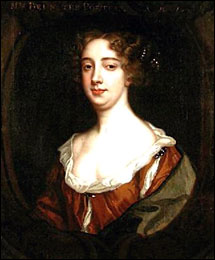On April 16, 1689, English novelist and playwright Aphra Behn died in London, England. She was a
prolific dramatist of the English Restoration period, and is considered the first
English professional female literary writer. Her writing contributed to the amatory
fiction genre of British literature and was preoccupied with sexual love and romance. It was an
early predecessor of the romance and was written by woman for woman. Information
regarding her life is scant, especially regarding her early years. This may be
due to intentional obscuring on Behn's part. Apocryphally, she was born in December
1640 in Harbledown near Canterbury. In The
Histories and Novels of the Late Ingenious Mrs. Behn (1696) it states that
Behn was born to Bartholomew Johnson, a barber, and Elizabeth Denham. There is
little verifiable evidence to confirm any one story. Johnson was related to Francis,
Lord Willoughby who commissioned him as lieutenant general of Surinam. In 1663,
Aphra may have traveled with her father to Surinam. He died on the journey;
however the rest of the family spent some months in the country. During this
trip Aphra is reputed to have met an African slave leader, whose story formed
the basis for one of her most famous works, Oroonoko
(1688). The story may be apocryphal; the veracity of her journey to Suriname
has been called into question. Shortly after her return to England from Surinam
in 1664, Aphra may have married Johan Behn, a merchant of German or Dutch
extraction. As with much of her life, there is little evidence for the facts of
her marriage. He died or the couple separated soon after 1664.
She was a
monarchist, and was dedicated to the restored King Charles II. As political
parties emerged during this time, Behn became a Tory supporter. By 1666 Behn
had become attached to the Court, possibly through the influence of Thomas
Culpepper and other associates. The Second Anglo-Dutch War had broken out
between England and the Netherlands in 1665 and she was recruited as a
political spy to Antwerp on behalf of King Charles II. Her code name is said to
have been Astrea, a name under which she later published many of her
writings. Her chief role was to establish an intimacy with William Scot, son of
Thomas Scot, a regicide who had been executed in 1660. William was believed to
be ready to become a spy in the English service and to report on the doings of
the English exiles that were plotting against the King. Behn's exploits were
not profitable, however. Charles was slow in paying (if he paid at all), either
for her services or for her expenses while abroad. Money had to be borrowed so
that Behn could return to London, where a year's petitioning of Charles for
payment went unheard and she ended up in a debtor’s prison. By 1669 an
undisclosed source had paid her debts and she was released from custody.
She soon began to
work for the King’s Company as a scribe. She had, however, only written poetry
up until this point. She cultivated the friendship of various playwrights and
poets, including John Dryden, and from 1670 until her death in 1689 she
produced many plays and novels, poems and pamphlets. Her first play The
Forc’d Marriage was staged in 1670, followed by The Amorous Prince
(1671). She gradually moved towards comic works, which proved commercially
successful. Her most popular works included The
Rover and Love-Letters Between a
Nobleman and his Sister (1684–87). Behn's novel Oroonoko (1688) is critically acknowledged as one of the most important
works in the development of the English novel. The book is the tale of an
enslaved African prince. It is notable for its exploration of slavery, race,
and gender. In the coming years, Behn was immensely prolific, adapting plays,
writing fiction and poetry, translating works from French and Latin. She caused
scandal in some of her chosen subject matter, often alluding to sexual desire.
She stated that the works would not have caused problems if they had been
written by a man. Behn's work frequently takes homoerotic themes, featuring
male to male love and her own sexual interest in women. As an example of her
work, her best known poem, "The Disappointment,” is a story of a sexual
encounter told from a woman's point of view that may be interpreted as a work
about male impotence.
Aphra Behn died on
April 16, 1689, and was buried in the East Cloister of Westminster Abbey. The
inscription on her tombstone reads: Here lies a Proof that Wit can never be Defence
enough against Mortality. She was quoted as stating that she had led a
"life dedicated to pleasure and poetry." In Virginia Woolf’s A Room of One’s Own, she wrote – “All
women together, ought to let flowers fall upon the grave of Aphra Behn... for
it was she who earned them the right to speak their minds... Behn proved that
money could be made by writing at the sacrifice, perhaps, of certain agreeable
qualities; and so by degrees writing became not merely a sign of folly and a
distracted mind but was of practical importance.”
Michael Thomas Barry is the author of Great Britain’s Literary Legends.
The book can be purchased from Amazon through the following links:



No comments:
Post a Comment